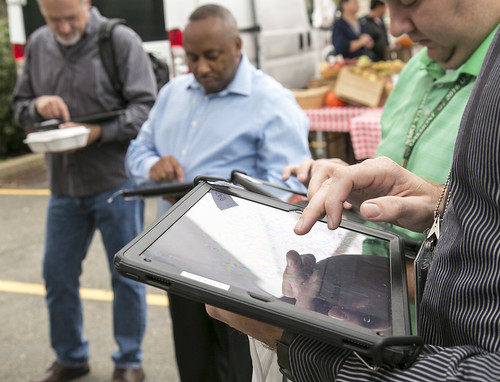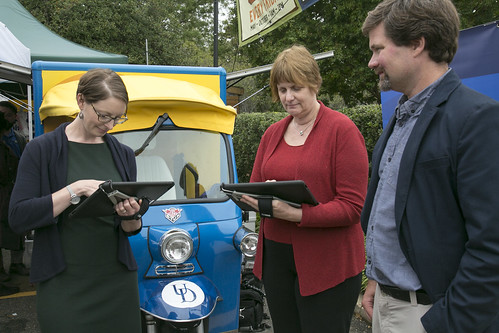
This post is part of the Science Tuesday feature series on the USDA blog. Check back each week as we showcase stories and news from USDA’s rich science and research portfolio.
What were visitors to USDA’s Farmers Market on Friday, Sept. 30, doing with the iPads they were holding? They certainly weren’t playing Pokemon Go! Instead, they were participating in a behavioral economics study about food choices.
The USDA Farmers Market, managed by USDA’s Agricultural Marketing Service (AMS) and located just steps from the National Mall in downtown Washington, D.C., is a “living laboratory” for farmers markets around the country. It’s also a great place to learn about the factors that influence customers’ buying decisions.
Researchers from the Center for Behavioral and Experimental Agri-Environmental Research (CBEAR) at the University of Delaware were at the market from 9 a.m. to 7 p.m. to conduct the study. More than 150 shoppers participated in the study which enabled them to purchase food with their money in an authentic setting. The study was funded by an Agriculture and Food Research Initiative (AFRI) grant from USDA’s National Institute for Food and Agriculture (NIFA) as part of its CONSERVE (COordinating Nontraditional Sustainable watER Use in Variable ClimatEs) Center for Excellence.
CBEAR, established in 2014 in partnership with USDA’s Economic Research Service (ERS), conducts behavioral and experimental economics research to better understand how and why people make decisions. This research, aimed at promoting consumer acceptance of food produced with new, sustainable farming practices, is part of ERS’s ongoing work on evidence-based policy.
We, the administrators of AMS and ERS, were pleased that so many consumers participated in this study. We also enjoyed the opportunity to see CBEAR’s “Tuk Tuk,” an eye-catching, three-wheel electric vehicle. Tuk Tuks are common in parts of Asia, but CBEAR’s Tuk Tuk is the only one of its kind in the United States. CBEAR’s researchers use it as a mobile lab because the Tuk Tuk easily carries computers and other equipment needed to conduct studies in field settings such as farmers markets and on farms and ranches.
CBEAR’s Co-Director Kent Messer told us that a number of the participants he met during the day not only provided valuable input to the study, but also expressed interest in learning about innovative farming techniques that can produce healthful food while promoting water conservation.
The research report that will include the findings from this field study at USDA’s Farmers Market is scheduled to be released next year and we’ll look forward to reading it!

